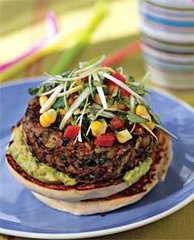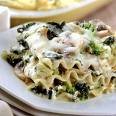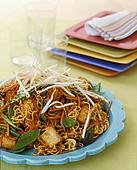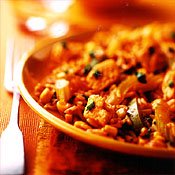My seven year old is a vegetarian. When she started her quest of avoiding meat we thought just cutting out meat itself would be enough, but it has become a journey of shocking, jaw-dropping discovery at just what contains ground-up animal parts. As a result, I am now a veggie. So I have gone from researching good recipes and nutritional information, which is essential for such a young vegetarian, to the family taking on a healthier, more compassionate outlook on life.
Monday, 2 April 2007
To lacto or not to lacto? That is not the only question......
You would think that by cutting out meat, you are a vegetarian. But as with all things in life, it is not that simple, there are many grey areas.
According to the ‘Vegetarian Society’ website (http://www.vegsoc.org) a vegetarian is someone living on a diet of grains, pulses, nuts, seeds, vegetables and fruits, with or without the use of dairy products and eggs.
A vegetarian does not eat any meat, poultry, game, fish, shellfish or crustacea, or slaughter by-products.
However, many people who call themselves vegetarians are actually semi-vegetarians. They may have eliminated red meat, but may eat poultry or fish.
Then there are types of vegetarian;
Lacto-ovo-vegetarian: Eats both dairy products and eggs. This is the most common type of vegetarian diet.
Lacto-vegetarian: Eats dairy products but not eggs.
Vegan: Does not eat dairy products, eggs, or any other animal product.
Vegetarianism is not a new concept, but what is a fairly recent phenomenon is the growing number of people who choose to adopt a vegetarian diet. A sure sign of this is the amount of vegetarian options on offer at the supermarkets, keen to keep abreast of market trends they stock both leading brand and increasingly their own store brand.
As vegetarianism becomes more prevalent and popular, many parents may wonder if kids can safely follow a vegetarian diet and still get all the nutrients necessary for growing up healthy and strong. Avoiding meat may sound like a bad idea, but, according to the ‘Kids Health for Parents’ website, most dietary and medical experts agree that a well-planned vegetarian diet can actually be a very healthy way to eat.
Then there are the stumbling blocks, the things that really make you want to go ‘yuck,’ as many foods contain ingredients derived from the slaughter of animals.
Gelatin is made from animal ligaments, tendons, bones etc which have been boiled in water. It is often found in confectionery, low fat spreads and desserts, and other dairy products.
The term animal fat refers to carcass fat and may be present in a wide range of foods, including biscuits, cakes, and margarines.
Suet and lard are types of animal fats.
Certain food additives (E numbers) may be derived from animal sources.
Cheese is often made with rennet extracted from the stomach lining of slaughtered calves. Although vegetarian cheese is made with rennet from a microbial source.
Many vegetarians that eat eggs will eat only free-range eggs. This is due to moral objections to the battery farming of hens.
For more information about ingredients which may be unsuitable for vegetarians, The Vegetarian Society has an information sheet, available at http://www.vegsoc.org/info/stumbling.html, some things you will have heard of, others guarantee you will go ‘yuck!’
According to the ‘Vegetarian Society’ website (http://www.vegsoc.org) a vegetarian is someone living on a diet of grains, pulses, nuts, seeds, vegetables and fruits, with or without the use of dairy products and eggs.
A vegetarian does not eat any meat, poultry, game, fish, shellfish or crustacea, or slaughter by-products.
However, many people who call themselves vegetarians are actually semi-vegetarians. They may have eliminated red meat, but may eat poultry or fish.
Then there are types of vegetarian;
Lacto-ovo-vegetarian: Eats both dairy products and eggs. This is the most common type of vegetarian diet.
Lacto-vegetarian: Eats dairy products but not eggs.
Vegan: Does not eat dairy products, eggs, or any other animal product.
Vegetarianism is not a new concept, but what is a fairly recent phenomenon is the growing number of people who choose to adopt a vegetarian diet. A sure sign of this is the amount of vegetarian options on offer at the supermarkets, keen to keep abreast of market trends they stock both leading brand and increasingly their own store brand.
As vegetarianism becomes more prevalent and popular, many parents may wonder if kids can safely follow a vegetarian diet and still get all the nutrients necessary for growing up healthy and strong. Avoiding meat may sound like a bad idea, but, according to the ‘Kids Health for Parents’ website, most dietary and medical experts agree that a well-planned vegetarian diet can actually be a very healthy way to eat.
Then there are the stumbling blocks, the things that really make you want to go ‘yuck,’ as many foods contain ingredients derived from the slaughter of animals.
Gelatin is made from animal ligaments, tendons, bones etc which have been boiled in water. It is often found in confectionery, low fat spreads and desserts, and other dairy products.
The term animal fat refers to carcass fat and may be present in a wide range of foods, including biscuits, cakes, and margarines.
Suet and lard are types of animal fats.
Certain food additives (E numbers) may be derived from animal sources.
Cheese is often made with rennet extracted from the stomach lining of slaughtered calves. Although vegetarian cheese is made with rennet from a microbial source.
Many vegetarians that eat eggs will eat only free-range eggs. This is due to moral objections to the battery farming of hens.
For more information about ingredients which may be unsuitable for vegetarians, The Vegetarian Society has an information sheet, available at http://www.vegsoc.org/info/stumbling.html, some things you will have heard of, others guarantee you will go ‘yuck!’
Subscribe to:
Post Comments (Atom)
































No comments:
Post a Comment